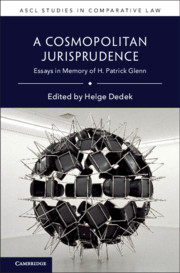Book contents
- A Cosmopolitan Jurisprudence
- ASCL Studies in Comparative Law
- A Cosmopolitan Jurisprudence
- Copyright page
- Epigraph
- Contents
- Foreword
- Acknowledgements
- Notes on Contributors
- Images
- Introduction
- Part I The Tradition of Comparative Law
- Part II The Concept of Tradition
- Part III Crossing Boundaries
- 11 The School of Salamanca: A Common Law?
- 12 The Un-Common Law
- 13 The Fabric of Normative Translation in Law
- 14 Statehood as Process: The Modern State Between Closure and Openness
- 15 Cosmopolitan Attachments
- H Patrick Glenn Publications
- Index
12 - The Un-Common Law
from Part III - Crossing Boundaries
Published online by Cambridge University Press: 10 December 2021
- A Cosmopolitan Jurisprudence
- ASCL Studies in Comparative Law
- A Cosmopolitan Jurisprudence
- Copyright page
- Epigraph
- Contents
- Foreword
- Acknowledgements
- Notes on Contributors
- Images
- Introduction
- Part I The Tradition of Comparative Law
- Part II The Concept of Tradition
- Part III Crossing Boundaries
- 11 The School of Salamanca: A Common Law?
- 12 The Un-Common Law
- 13 The Fabric of Normative Translation in Law
- 14 Statehood as Process: The Modern State Between Closure and Openness
- 15 Cosmopolitan Attachments
- H Patrick Glenn Publications
- Index
Summary
National courts today find themselves ever more confronted with issues that are borderless, and sometimes global. This Chapter looks at the past of the common law and some aspects of its origins, evolution, and characteristics. The common law, which has come to define a conception of law standing in stark contrast to that of the Continental European civilian legal orders, including none more so than France’s, has been an irony of fate in its evolution, consolidated and strengthened as it was through the efforts of a Norman French king. If we think of matters calling most urgently for transnational solutions, do the origins of the common law suggest differences of a nature that would create insuperable obstacles to a new jus commune? Methodologically, the civil and common law systems continue to clash. Yet the questions their courts face today are increasingly issues of jurisdiction, of the reach of domestic courts beyond the territories that define national sovereignty. We already have seen innovative strides by courts in numerous states in recent years to meet the needs of transnationalizing law. With increasing comprehension can come harmony and fruitful mutual consultation, if humanity decides that it wishes to proceed towards this goal.
- Type
- Chapter
- Information
- A Cosmopolitan JurisprudenceEssays in Memory of H. Patrick Glenn, pp. 236 - 248Publisher: Cambridge University PressPrint publication year: 2021

